Marina Mahathir's Blog
December 5, 2012
The Year That Was
Dear everyone,
I know, I know, I've been very bad. Haven't posted anything since August. But life has been ridiculously busy with so many different projects. In November I launched my new book Telling It Straight which is a compilation of some of my columns from around 2001 til 2012. The excuse was that I was invited to the Singapore Writers' Festival and it seemed like a good occasion to launch a book, seeing as it's been 15 years since my first one, In Liberal Doses. (My second was 50 Days which was a compilation of my blogposts about my Dad's operation in 2007 and was published by ZI Publications). My publishers, Editions Didier Millet, agreed and that was how the book came to be.
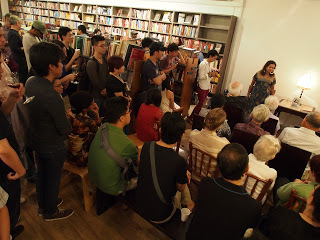 Launch of my book at Select Books, Singapore.
Launch of my book at Select Books, Singapore.
So far it's been doing pretty well. We sold out of the first printing within two weeks and now the second printing is out ( each print run is 5000 copies). It's number 1 on Borders' best-seller list which is unsurprising because Borders has done a lot to promote it. So far I've done five booksignings at various Borders stores including three in the Klang Valley and two in Penang. This Sunday Dec 9 I'll be at MPH at Subang Parade from 1-2pm if you'd like your books signed.
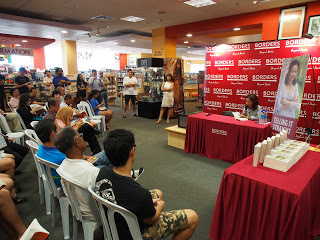 Reading and booksigning session at Borders, the Curve.
Reading and booksigning session at Borders, the Curve.
This week also is another first for me, which is the release of the e-book version of both Telling It Straight and In Liberal Doses. So those of you who live far away can download it from Amazon, Apple store, Kobo and Asiabooks, and probably other sites as well. So exciting!
So thank you everyone for your kind support! If you have been following my column Musings in the Star, you'll know that some of them don't get published or are severely cut. Three of those are in the book, as well as some short introductions to each section of the book. So you'll find some new things to read as well in there.
Meanwhile....my column today got axed again. I should have expected it I suppose since it's a review if you like of some of the issues raised at the UMNO General Assembly. And I guess I wasn't too subtle about it. But some things need to be said outright I think.
Anyway, read for yourself:
World AIDS Day just went by with all the usual newspaper features on the current statistics in our country and the problems limiting our ability to contain the epidemic. Chief among these is stigma and discrimination, the perpetuation of myths and falsehoods about both the disease and the people who live with it, causing fear, secrecy and, sometimes, outright violations of the human rights of HIV-positive people and those around them.
It seems ironic to me that while World AIDS Day features in the papers aim to enlighten the public about HIV/AIDS, at the very same time, a group of people gathered to triumphantly tout their ignorance, their prejudice and their hate. Blaming all the ills of society on those most marginalized and vulnerable, they hooted and cawed their fears and directed their disgust towards a group they cannot clearly identify. Yet they claim that society may only be saved if we put the different and defenceless into camps, much like the people of Gaza are put into a large prison camp, to be punished for their ‘mistake’ of trying to choose their own destiny.
There is nothing more fascinating than watching a group so devoted to displaying such willful hate. Some even called themselves God’s chosen ones, a familiar phrase to those of us who follow Zionist politics. The implications of such a claim is obvious; if God has chosen some people to lead us, why the need for elections when voters would make the likely mistake of choosing the wrong ones? Why not just abandon elections and let God choose? Where have we heard this before? Is this theocracy-lite, without the turbans and beards?
So retrograde was the discussion at this assembly that it felt like a 1950s movie. Once again, we were told, by a woman no less, that we already have gender equality in this country and therefore there is no need for any women’s rights activists. Coming from someone who has done very little to advance women’s rights in this country, this can only be expected. After all, while demanding 30% of the seats for women in the next General Elections, the same person had to ask a man to represent them to get permission for such allocations. Why ask yourself when you can ask a man to do it for you? Now that’s 1950s activism, none of this feminism business!
I must say it was a sublime moment: the leader of a woman’s movement triumphantly stating that there are no issues for women to fight for because everything is OK. Tell that to the many single mothers fighting for their rights in our courts, the many women who remain legally married but in reality have no spouses, the women who lose their property when their husbands die, the many women black and blue from beatings at the hands of their dearly beloveds every day. Tell that to our young women who after graduating find that some jobs are cut off from them because of their gender, or those who find jobs and then have to endure a workplace that is uncomfortable and subtly hostile through crass comments and even physical affronts. Or the many women bypassed for promotion by less-qualified men.
Like the targeting of minority and marginalized groups, this trumpeting of ‘non-activism’ is only a distraction from the pressing problems of the day. The word ‘corruption’ was barely heard at all, unless it referred to sexual mores as if those are the only ones that can be corrupted. ‘Ethics’ was not in anyone’s vocabulary, much less ‘justice’. So insular was the talk that I don’t even recall the words ‘Gaza’ or ‘Rohingyas’, even while thousands of our fellow brethren are suffering.
The trouble with insularity is that it ignores one simple fact: the world is watching. With smart phones, broadband and social media, what is said within any gathering is transmitted outside and all round the world in a second. Playing to the gallery may be a valid strategy within the confines of an exclusive group but with technology, there are now many different galleries all watching at the same time. I hope some people within the group had the decency to at least cringe at the more outrageous pronouncements.
If this is the pre-election rah-rah session, it truly baffles me how it would work. Those of us outside pay attention to get some idea of what we can hope for when we cast our votes in the next few months. But I’m probably not alone in finding little to hold on to except for a group that looks like it’s under siege and is blaming everyone but itself for its own failures.
The rest of us, meanwhile, are already ticking our voting ballots. ***********************************************************************Um, yes.. Anyway the year has been eventful in many ways. And yes we all labour with the cloud of pending elections over our heads. Can't wait for it to be over and maybe, just maybe, people will go back to being normal again.Meanwhile let me wish all of you a very merry festive season, Merry Christmas to all who celebrate and a 2013 that will be more sane than 2012 has been.
Peace!
I know, I know, I've been very bad. Haven't posted anything since August. But life has been ridiculously busy with so many different projects. In November I launched my new book Telling It Straight which is a compilation of some of my columns from around 2001 til 2012. The excuse was that I was invited to the Singapore Writers' Festival and it seemed like a good occasion to launch a book, seeing as it's been 15 years since my first one, In Liberal Doses. (My second was 50 Days which was a compilation of my blogposts about my Dad's operation in 2007 and was published by ZI Publications). My publishers, Editions Didier Millet, agreed and that was how the book came to be.
 Launch of my book at Select Books, Singapore.
Launch of my book at Select Books, Singapore.So far it's been doing pretty well. We sold out of the first printing within two weeks and now the second printing is out ( each print run is 5000 copies). It's number 1 on Borders' best-seller list which is unsurprising because Borders has done a lot to promote it. So far I've done five booksignings at various Borders stores including three in the Klang Valley and two in Penang. This Sunday Dec 9 I'll be at MPH at Subang Parade from 1-2pm if you'd like your books signed.
 Reading and booksigning session at Borders, the Curve.
Reading and booksigning session at Borders, the Curve.This week also is another first for me, which is the release of the e-book version of both Telling It Straight and In Liberal Doses. So those of you who live far away can download it from Amazon, Apple store, Kobo and Asiabooks, and probably other sites as well. So exciting!
So thank you everyone for your kind support! If you have been following my column Musings in the Star, you'll know that some of them don't get published or are severely cut. Three of those are in the book, as well as some short introductions to each section of the book. So you'll find some new things to read as well in there.
Meanwhile....my column today got axed again. I should have expected it I suppose since it's a review if you like of some of the issues raised at the UMNO General Assembly. And I guess I wasn't too subtle about it. But some things need to be said outright I think.
Anyway, read for yourself:
World AIDS Day just went by with all the usual newspaper features on the current statistics in our country and the problems limiting our ability to contain the epidemic. Chief among these is stigma and discrimination, the perpetuation of myths and falsehoods about both the disease and the people who live with it, causing fear, secrecy and, sometimes, outright violations of the human rights of HIV-positive people and those around them.
It seems ironic to me that while World AIDS Day features in the papers aim to enlighten the public about HIV/AIDS, at the very same time, a group of people gathered to triumphantly tout their ignorance, their prejudice and their hate. Blaming all the ills of society on those most marginalized and vulnerable, they hooted and cawed their fears and directed their disgust towards a group they cannot clearly identify. Yet they claim that society may only be saved if we put the different and defenceless into camps, much like the people of Gaza are put into a large prison camp, to be punished for their ‘mistake’ of trying to choose their own destiny.
There is nothing more fascinating than watching a group so devoted to displaying such willful hate. Some even called themselves God’s chosen ones, a familiar phrase to those of us who follow Zionist politics. The implications of such a claim is obvious; if God has chosen some people to lead us, why the need for elections when voters would make the likely mistake of choosing the wrong ones? Why not just abandon elections and let God choose? Where have we heard this before? Is this theocracy-lite, without the turbans and beards?
So retrograde was the discussion at this assembly that it felt like a 1950s movie. Once again, we were told, by a woman no less, that we already have gender equality in this country and therefore there is no need for any women’s rights activists. Coming from someone who has done very little to advance women’s rights in this country, this can only be expected. After all, while demanding 30% of the seats for women in the next General Elections, the same person had to ask a man to represent them to get permission for such allocations. Why ask yourself when you can ask a man to do it for you? Now that’s 1950s activism, none of this feminism business!
I must say it was a sublime moment: the leader of a woman’s movement triumphantly stating that there are no issues for women to fight for because everything is OK. Tell that to the many single mothers fighting for their rights in our courts, the many women who remain legally married but in reality have no spouses, the women who lose their property when their husbands die, the many women black and blue from beatings at the hands of their dearly beloveds every day. Tell that to our young women who after graduating find that some jobs are cut off from them because of their gender, or those who find jobs and then have to endure a workplace that is uncomfortable and subtly hostile through crass comments and even physical affronts. Or the many women bypassed for promotion by less-qualified men.
Like the targeting of minority and marginalized groups, this trumpeting of ‘non-activism’ is only a distraction from the pressing problems of the day. The word ‘corruption’ was barely heard at all, unless it referred to sexual mores as if those are the only ones that can be corrupted. ‘Ethics’ was not in anyone’s vocabulary, much less ‘justice’. So insular was the talk that I don’t even recall the words ‘Gaza’ or ‘Rohingyas’, even while thousands of our fellow brethren are suffering.
The trouble with insularity is that it ignores one simple fact: the world is watching. With smart phones, broadband and social media, what is said within any gathering is transmitted outside and all round the world in a second. Playing to the gallery may be a valid strategy within the confines of an exclusive group but with technology, there are now many different galleries all watching at the same time. I hope some people within the group had the decency to at least cringe at the more outrageous pronouncements.
If this is the pre-election rah-rah session, it truly baffles me how it would work. Those of us outside pay attention to get some idea of what we can hope for when we cast our votes in the next few months. But I’m probably not alone in finding little to hold on to except for a group that looks like it’s under siege and is blaming everyone but itself for its own failures.
The rest of us, meanwhile, are already ticking our voting ballots. ***********************************************************************Um, yes.. Anyway the year has been eventful in many ways. And yes we all labour with the cloud of pending elections over our heads. Can't wait for it to be over and maybe, just maybe, people will go back to being normal again.Meanwhile let me wish all of you a very merry festive season, Merry Christmas to all who celebrate and a 2013 that will be more sane than 2012 has been.

Peace!
Published on December 05, 2012 21:09
August 13, 2012
No Postings Tomorrow!
Published on August 13, 2012 02:23
May 29, 2012
Impersonation is not Flattery
Imitation may be a form of flattery but impersonation is not. I have just found out that someone's been posting articles online that are purportedly by me. Like this one. Now anyone who's followed me all these years will recognise the way I write. And that article is not my style at all.
I have reason to be concerned about this. The Government has just passed a new law, the Evidence Amendment (No 2) Act 2012, which among other things, will go after anyone who allegedly posts views that may be different from others, even if they have posted them anonymously or by using a pseudonym. For an explanation of this, read this and this.
What this means for me is, if someone impersonates me and posts things which I didn't say, I would still be held liable for them. Unless I can prove that it wasn't me. In other words, I am guilty of posting those words until I can prove I'm innocent. Is this justice?? Interestingly enough, as far back as 2007, people have addressed this problem, as in this article.
So people, please do take note. This is my only blog. Apart from this, I write my column, Musings in The Star. Occasionally I will write a piece for some other online portal but never another blog. Be wary also of 'quotes' by me that cannot be traced to any source, such as newspaper interviews, and comments by me that really don't sound like me. As you know, I'm always polite so anything that has lots of rude words in it is definitely NOT me. I've been told that someone makes comments under the name 'Marina M'. There's a slight difference between that and how I identify myself. If you're ever in doubt, ask me.
Thank you!
Published on May 29, 2012 02:42
May 7, 2012
No, We're Not Egypt..I think...
When the Arab Spring happened in January 2011, our leaders reacted in a very odd fashion. The first response was to bring all our students in Egypt, all 11000 of them, home as if Egypt had just turned into a warzone and our students were in grave danger. It was very clear however, from what the students themselves said when they got home, that there was no physical danger at all. The ‘danger’ was more in the heads of our leaders who were perhaps afraid that our young people might get some funny ideas about democracy. Perhaps they thought the word doesn’t exist in Arabic.
There were also a lot of protestations by our leaders that Malaysia is not Egypt and our PM is not Mubarak. Well yes, Malaysia is certainly more economically advanced than Egypt. It doesn’t have the high levels of poverty and great inequalities that that country has had for decades, as well as the high youth unemployment, all of which added to the recipe for unrest that was bound to come at some time.
So no, we are not Egypt. But you know what they say about how people doth protest too much. What is this obsession with us NOT being Egypt anyway? If we’re not, then why worry? Besides, who needs to worry about the Arab Spring unless they identify themselves with Ben Ali, Mubarak, Gadaffi and Assad?
And if our PM is not Mubarak – that ex-Air Chief Marshall of the Egyptian Air Force who ruled for nearly 30 years and is now on trial on allegations of corruption as well as the premeditated murder of peaceful protestors – then what is he?
Mubarak used to torture people he didn’t like. Mubarak was allegedly very corrupt.
Mubarak was much adored by the Americans, which was why they didn’t know what to do when the revolution started. After all they got Egypt to sign a peace treaty with Israel. During the Gaza siege two years ago, it was the Egyptians who obstructed aid from going to Gaza through Rafah. Nice guy, Mubarak.
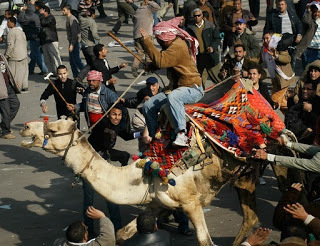 Egyptian protestors were attacked by thugs on camels in Tahrir Square.
Egyptian protestors were attacked by thugs on camels in Tahrir Square.So what exactly was wrong with the demands made by the Egyptian people assembling in Tahrir Square? They want a greater say in the policies of the government. They want an end to corruption. They want proper elections with many candidates to choose from, not just those handpicked by the rulers. They want an end to military interference in politics. They want proper management of the economy and the many problems resulting from the mismanagement of it. Aren’t these reasonable?
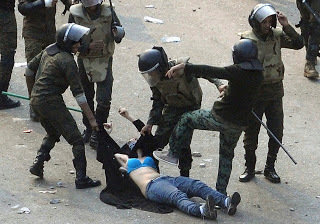 Egyptian police trying to arrest a female protestor in Tahrir Square.
Egyptian police trying to arrest a female protestor in Tahrir Square.But our government will not acknowledge that these demands are quite normal. Well maybe they’re not in an undemocratic country. But by refusing to support the Egyptian people’s right to all of these, do they support Mubarak and the Supreme Council of the Armed Forces (SCAF)? You know, the ones who attacked their own people in Tahrir Square and killed some. The ones who did virginity tests on women protestors. The ones who tried to shut down the internet during the revolution?
The ones who are trying to rig the elections?
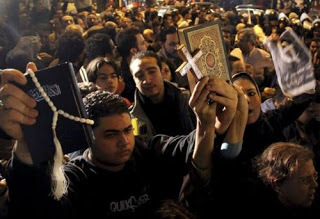 Egyptian Muslims and Christians in solidarity at Tahrir Square --isn't this good?
Egyptian Muslims and Christians in solidarity at Tahrir Square --isn't this good?If the Tahrir Square occupiers brought down someone like Mubarak, is that necessarily bad? They still wanted to have proper elections afterwards. And lo and behold, the Muslim Brotherhood won many seats. Well, that’s democracy, it doesn’t necessarily give you the best government. But that’s no reason to get rid of democracy.
If Malaysia is not Egypt and our leaders are not Mubarak, then why are Malaysians who went to Bersih treated like Egyptian protestors? As Tommy Thomas has pointed out here, Malaysians are not much into occupying anything. They did not bring out tents and blankets so that they can sleep in Dataran Merdeka til the government was brought down. If anyone had gone down to Dataran on the Sunday after Bersih 3.0, apart from the barbed wire, everything was back to normal. The cars were out in the streets. The malls were packed. The restaurants were full. Made our point, now let’s go eat.
This is why we are not Egypt. In this we agree with our government. We are NOT Egypt. But then why respond in such Mubarak-like fashion?
The National Fatwa Council has issued a fatwa to say that demonstrations against the government are haram. This is exactly what the head of the Al-Azhar University Fatwa Committee said in the days after January 25 2011 when the Egyptian revolution started. He seemed totally out of touch with his people and the events that were unfolding. Even the Muslim Brotherhood, or at least the younger members, were out there demonstrating, along with their more secular fellow citizens, Muslim and Christian, men and women, young and old. So getting the NFC ( hmmm…dubious initials…) to issue such a fatwa seems very Mubarak-like, doesn’t it?
Does this mean, by the way, that demonstrations against the governments of Penang, Kedah and Selangor are now haram too? Or only if they are against the Federal Government?
If I now want to have a demonstration against, say, Perkasa, I can, right? Since they’re not the government?
Published on May 07, 2012 22:36
May 3, 2012
Testimonies to Truth
Hi folks, no doubt you've read the mainstream media's take on events last Saturday. But there is nothing like the personal accounts of those who were there.
Here are some of them:
1. My Bersih 3.0 Experience : The Day The Police Became Hooligans -Christina Foo
2. My Bersih 3.0 Experience: Annabelle R .
3. At Bersih rally, a convergence of angry youths and Lake Club members
4. Bersih 3.0 from the eyes of a medic (this is an incredibly heroic one)
5. They were all yellow (by the daughter of an FRU officer..)
6. Whom to Blame for the Storming of the Barricades
7. Many People Failed Malaysia on Saturday
8. Tech-fuelled political awakening
9. Bersih 3.0: Public Order and Preservation (very interesting)
There will no doubt be many more, as well as many thousands of videos and photographs. But they are all valid testimonies to what happened. When we start looking for the truth, these will be important.
Happy reading!
Here are some of them:
1. My Bersih 3.0 Experience : The Day The Police Became Hooligans -Christina Foo
2. My Bersih 3.0 Experience: Annabelle R .
3. At Bersih rally, a convergence of angry youths and Lake Club members
4. Bersih 3.0 from the eyes of a medic (this is an incredibly heroic one)
5. They were all yellow (by the daughter of an FRU officer..)
6. Whom to Blame for the Storming of the Barricades
7. Many People Failed Malaysia on Saturday
8. Tech-fuelled political awakening
9. Bersih 3.0: Public Order and Preservation (very interesting)
There will no doubt be many more, as well as many thousands of videos and photographs. But they are all valid testimonies to what happened. When we start looking for the truth, these will be important.
Happy reading!
Published on May 03, 2012 01:23
April 29, 2012
April 28, 2012
My Bersih 3.0 Experience: Behind the Barbed-Wire Barricades
It was the barbed wire that did it for me. Up til Friday afternoon I was still unsure about going. My hubby thought I'd already made my point last year. I was annoyed with continually being asked whether I was going or not, more so with the non-story that came out in M'kini which basically said I hadn't decided yet. I mean, does it matter?
Then I saw the photos of the police rolling out the barbed wire and I saw red. Since when did our police, or whoever is their boss, roll out barbed wire - barbed wire!! - against their own people?? Are we thugs? Terrorists? Thieves?
So I decided to go. I contacted friends and found out their plans on how to get round the roads which were sure to be blocked and the LRT which may be stopped. The same friend who so kindly offered to be my 'bodyguard' last year offered himself again. We got into my car, went to collect some other friends and drove to as close to Central Market as we could.
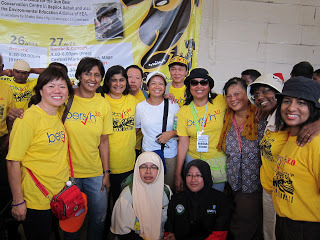 Women's groups together at Central Market.Part of the way down Jln Brickfields we couldn't go any further so we got down to walk. On one side of the street were thousands of people in yellow walking in the direction of the Central Market. On the other side of the street were hundreds of police in their dark blue uniforms. But they didn't look hostile and just watched us go by.
Women's groups together at Central Market.Part of the way down Jln Brickfields we couldn't go any further so we got down to walk. On one side of the street were thousands of people in yellow walking in the direction of the Central Market. On the other side of the street were hundreds of police in their dark blue uniforms. But they didn't look hostile and just watched us go by.
We got to the Central Market which was swarming with people. Earlier I'd read a tweet that said that people were going into the Market to have lunch and my friends and I were laughing about Malaysians and their food. "Well," we said, "Central Market restaurants will get a lot of business!". But when we got there, the Market was totally closed. So all those restaurants lost business today!
Caught up with friends in the car park while we sat to wait. It was HOT!! On the little CM stage, Ambiga was seated there with many of our colleagues from women's groups. I went up to say hello, took some photos and then went down to wait again. At 1.20 or so, Ambi took the mike to announce that we were going to move off soon, heading towards Dataran Merdeka. But, she added, we were not to breach the barriers, we would only go as far as we could and then we would simply sit down for a while and then disperse.
The atmosphere was much more fiesta-like than last year. There were people in yellow t-shirts or in other colours, in shorts or in tudungs, lots of young ones and some also of a certain age. Like last year, it was a very diverse crowd. I bumped into some old friends, some young people I knew including a nephew and the children of some friends, and met some new ones, people who were coming to a rally for the first time ever. These were not radical highly-politicised types, just your average men and women, the type you'd meet at the supermarket perhaps. I asked one newbie woman why she came and she said it was because she realised that if she wanted change, then she had to do something.
After Ambiga spoke and a quick briefing by the marshalls, we moved off. Because of the crowd we made our way slowly, stopping every now and then to take photos of the awesome crowd and ourselves. At Central Market I estimated there were at least 6000 people that I could see (though I have to say I'm bad at estimates) but many many more joined us as we walked along.
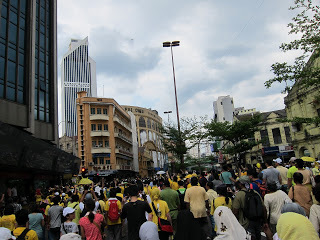 The crowd moving from Central Market towards Dataran Merdeka (in a roundabout way)
The crowd moving from Central Market towards Dataran Merdeka (in a roundabout way)
When we got to Lebuh Pasar Besar, there was a big crowd on it facing the direction of Dataran Merdeka while others continued on to Jalan Tun Perak. We decided we would stay on Lebuh Pasar Besar (where the Bar Council is) and made our way towards the bridge across the Klang River (just before Agro Bank). That was where we had to stop because the police had put up a barrier of barbed wire (actually my husband said it's razor wire, not barbed wire) and those red plastic road barriers, all stamped 'DUKE'. On the other side of the barrier stood a whole row of police. Most look quite senior and they simply stood there and looked at us.
 This is razor wire...
This is razor wire...
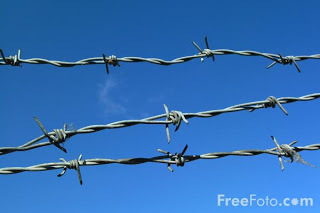 And this is barbed wire...
And this is barbed wire...
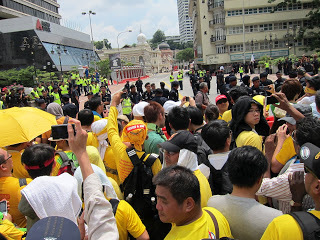 View of Lebuh Pasar Besar towards Dataran Merdeka. We are behind the barriers and the cops are beyond.
View of Lebuh Pasar Besar towards Dataran Merdeka. We are behind the barriers and the cops are beyond.
I got to the front of the barrier where someone had put up a sign that said 'Welcome to Tel Aviv'. It felt very accurate. The police recognised me and nodded. I asked them, "What is this?" pointing at the razor wire, which has blades on them which can seriously cut you if you get hurled on to them (see close-up pic above). The senior cop there shrugged and gave a wan smile. "This makes me sad," I said to him. Again he shrugged.
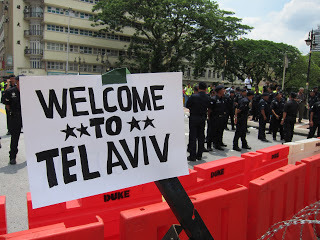 Pretty apt...
Pretty apt...
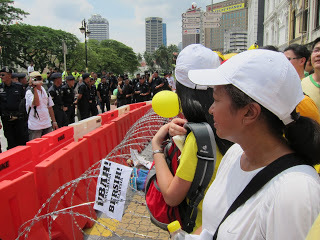 Me in front of the barricade. See the razor wire?
Me in front of the barricade. See the razor wire?
We stood there for a while. Some people started to sing Negara Ku so we all joined in. The senior cop who shrugged at me stood at attention, really the only one who did so. Some people started chanting 'Bukak, bukak!' meaning open the barriers. But overall there were high spirits but nothing provocative.
Then suddenly all the cops moved back, away from us. We were puzzled but in a short while we realised why. Several police trucks moved in and headed in our direction. For a moment I wondered if they were simply going to mow us down. Then they retreated again. Next a whole row of police with helmets, batons and shields formed in front of the trucks facing us. Again we wondered if they were going to charge us, which seems silly because they too would have come up against the razor wire.
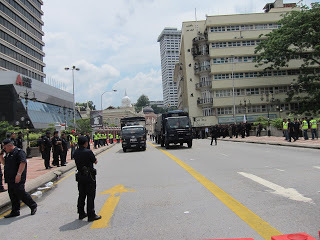 Then the trucks came out...
Then the trucks came out...
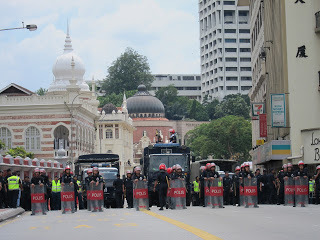 And the shields and batons...
And the shields and batons...
Someone then told us to sit down. So we did on our side of the barrier while on the other side, about 10 metres away, the police were lined up with their shields and batons. It looked like it was going to be a battle of wills, who would last longer in the heat . We were prepared to sit for the next two hours til 4pm, the appointed dispersal time.
After about 15 minutes sweating behind the razor wire, someone told us to move back and disperse. "We must use our brains. Don't provoke. It's time to move back." So we moved away from the barriers and milled around the streets, just looking at people. Bumped into more friends and chatted to random people who said hello. It was a nice atmosphere, akin to going to a fun run or something like that.
We then read a Star tweet that said that Ambiga said Bersih 3.0 was already successful and we can all now disperse. So my friends and I made our way back to Brickfields, got into my car and drove home.
It was only after that that we started to get smses and tweets regarding teargas at Dataran Merdeka. It was a shock because up til then there was nothing to indicate that the police might do that, even when they brought the ones with the helmets and shields out. We passed many cops on our way home and they hardly looked at us.
My phone was running out of battery and I had to wait til I got home before hearing from my daughter that she had been teargassed. She was part of a team videostreaming the events today and was near Dataran Merdeka, stuck among thousands of people, when some people, against Bersih's instructions, breached the barriers and ran onto the Dataran. The police then started running away from them and soon they saw why: the teargas canisters being fired at them. Her first time being teargassed, she said it was awful but people around her were all helping one another. What was more frightening was the fear of being crushed but luckily people were so mindful of this that if anyone fell, they were immediately given space and a hand up. She's fine though and I never really worried about her because she had a friend with her who was tasked with making sure she was alright.
(Her videos, along with those by others, are now on the Bersih428 Youtube channel).
Since reaching home, I've been trying to keep up with the many many reports on today's events, both the good and the bad. Yes, there were some people who misbehaved, let's be honest. We don't know who they are but in such a large crowd there are bound to be people like that, despite instructions from the Bersih steering committee and marshalls not to provoke anyone. There are also very likely agent provocateurs who are out to make trouble and discredit Bersih.
But it doesn't detract from the fact that an unbelievable number of people turned out today, far more than last year, and compared to the incidents of bad behaviour, there was a far larger number of people who marched and rallied peacefully. I hardly saw anyone with a frown or a scowl but lots of happy smiles. Just like last year, I never once felt unsafe. Instead I felt part of a large Malaysian community, all together for one cause. Or two, since the anti-Lynas people also turned out in huge numbers.
Here's a report from the UK's Independent newspaper which is pretty accurate although there were far far more than 25000 people there. It was hard to see everybody but it had to be about 50000-80000. There are thousands and thousands of photos and videos being uploaded right now. So go take a look and decide for yourself. I also hope people will put up their personal stories too.
I'm sorry that there were people who got injured, both protestors and police. None of that was really necessary. A few weeks ago, at the International Women's Day rally in PJ, 5000 people turned up and there was absolutely no violence because the police left everyone alone to do their thing. The same could have happened today, if only the powers-that-be could have been wiser.
One more thing, about those politicians who were there. At Central Market there were some there but they were not allowed to speak. Along the march, if anyone started any chants that sounded political, others wouldn't take it up and they pretty soon petered out. Like last year, the most popular chants were those that simply said 'Bersih' and 'Hidup Rakyat'. Most were simple ordinary people, who just want to express how they feel and who really have no time for politicians.
Besides, which politician or political party, from any side, can mobilise anything as incredible as Global Bersih?
Then I saw the photos of the police rolling out the barbed wire and I saw red. Since when did our police, or whoever is their boss, roll out barbed wire - barbed wire!! - against their own people?? Are we thugs? Terrorists? Thieves?
So I decided to go. I contacted friends and found out their plans on how to get round the roads which were sure to be blocked and the LRT which may be stopped. The same friend who so kindly offered to be my 'bodyguard' last year offered himself again. We got into my car, went to collect some other friends and drove to as close to Central Market as we could.
 Women's groups together at Central Market.Part of the way down Jln Brickfields we couldn't go any further so we got down to walk. On one side of the street were thousands of people in yellow walking in the direction of the Central Market. On the other side of the street were hundreds of police in their dark blue uniforms. But they didn't look hostile and just watched us go by.
Women's groups together at Central Market.Part of the way down Jln Brickfields we couldn't go any further so we got down to walk. On one side of the street were thousands of people in yellow walking in the direction of the Central Market. On the other side of the street were hundreds of police in their dark blue uniforms. But they didn't look hostile and just watched us go by.We got to the Central Market which was swarming with people. Earlier I'd read a tweet that said that people were going into the Market to have lunch and my friends and I were laughing about Malaysians and their food. "Well," we said, "Central Market restaurants will get a lot of business!". But when we got there, the Market was totally closed. So all those restaurants lost business today!
Caught up with friends in the car park while we sat to wait. It was HOT!! On the little CM stage, Ambiga was seated there with many of our colleagues from women's groups. I went up to say hello, took some photos and then went down to wait again. At 1.20 or so, Ambi took the mike to announce that we were going to move off soon, heading towards Dataran Merdeka. But, she added, we were not to breach the barriers, we would only go as far as we could and then we would simply sit down for a while and then disperse.
The atmosphere was much more fiesta-like than last year. There were people in yellow t-shirts or in other colours, in shorts or in tudungs, lots of young ones and some also of a certain age. Like last year, it was a very diverse crowd. I bumped into some old friends, some young people I knew including a nephew and the children of some friends, and met some new ones, people who were coming to a rally for the first time ever. These were not radical highly-politicised types, just your average men and women, the type you'd meet at the supermarket perhaps. I asked one newbie woman why she came and she said it was because she realised that if she wanted change, then she had to do something.
After Ambiga spoke and a quick briefing by the marshalls, we moved off. Because of the crowd we made our way slowly, stopping every now and then to take photos of the awesome crowd and ourselves. At Central Market I estimated there were at least 6000 people that I could see (though I have to say I'm bad at estimates) but many many more joined us as we walked along.
 The crowd moving from Central Market towards Dataran Merdeka (in a roundabout way)
The crowd moving from Central Market towards Dataran Merdeka (in a roundabout way)When we got to Lebuh Pasar Besar, there was a big crowd on it facing the direction of Dataran Merdeka while others continued on to Jalan Tun Perak. We decided we would stay on Lebuh Pasar Besar (where the Bar Council is) and made our way towards the bridge across the Klang River (just before Agro Bank). That was where we had to stop because the police had put up a barrier of barbed wire (actually my husband said it's razor wire, not barbed wire) and those red plastic road barriers, all stamped 'DUKE'. On the other side of the barrier stood a whole row of police. Most look quite senior and they simply stood there and looked at us.
 This is razor wire...
This is razor wire... And this is barbed wire...
And this is barbed wire... View of Lebuh Pasar Besar towards Dataran Merdeka. We are behind the barriers and the cops are beyond.
View of Lebuh Pasar Besar towards Dataran Merdeka. We are behind the barriers and the cops are beyond.I got to the front of the barrier where someone had put up a sign that said 'Welcome to Tel Aviv'. It felt very accurate. The police recognised me and nodded. I asked them, "What is this?" pointing at the razor wire, which has blades on them which can seriously cut you if you get hurled on to them (see close-up pic above). The senior cop there shrugged and gave a wan smile. "This makes me sad," I said to him. Again he shrugged.
 Pretty apt...
Pretty apt... Me in front of the barricade. See the razor wire?
Me in front of the barricade. See the razor wire?We stood there for a while. Some people started to sing Negara Ku so we all joined in. The senior cop who shrugged at me stood at attention, really the only one who did so. Some people started chanting 'Bukak, bukak!' meaning open the barriers. But overall there were high spirits but nothing provocative.
Then suddenly all the cops moved back, away from us. We were puzzled but in a short while we realised why. Several police trucks moved in and headed in our direction. For a moment I wondered if they were simply going to mow us down. Then they retreated again. Next a whole row of police with helmets, batons and shields formed in front of the trucks facing us. Again we wondered if they were going to charge us, which seems silly because they too would have come up against the razor wire.
 Then the trucks came out...
Then the trucks came out... And the shields and batons...
And the shields and batons...Someone then told us to sit down. So we did on our side of the barrier while on the other side, about 10 metres away, the police were lined up with their shields and batons. It looked like it was going to be a battle of wills, who would last longer in the heat . We were prepared to sit for the next two hours til 4pm, the appointed dispersal time.
After about 15 minutes sweating behind the razor wire, someone told us to move back and disperse. "We must use our brains. Don't provoke. It's time to move back." So we moved away from the barriers and milled around the streets, just looking at people. Bumped into more friends and chatted to random people who said hello. It was a nice atmosphere, akin to going to a fun run or something like that.
We then read a Star tweet that said that Ambiga said Bersih 3.0 was already successful and we can all now disperse. So my friends and I made our way back to Brickfields, got into my car and drove home.
It was only after that that we started to get smses and tweets regarding teargas at Dataran Merdeka. It was a shock because up til then there was nothing to indicate that the police might do that, even when they brought the ones with the helmets and shields out. We passed many cops on our way home and they hardly looked at us.
My phone was running out of battery and I had to wait til I got home before hearing from my daughter that she had been teargassed. She was part of a team videostreaming the events today and was near Dataran Merdeka, stuck among thousands of people, when some people, against Bersih's instructions, breached the barriers and ran onto the Dataran. The police then started running away from them and soon they saw why: the teargas canisters being fired at them. Her first time being teargassed, she said it was awful but people around her were all helping one another. What was more frightening was the fear of being crushed but luckily people were so mindful of this that if anyone fell, they were immediately given space and a hand up. She's fine though and I never really worried about her because she had a friend with her who was tasked with making sure she was alright.
(Her videos, along with those by others, are now on the Bersih428 Youtube channel).
Since reaching home, I've been trying to keep up with the many many reports on today's events, both the good and the bad. Yes, there were some people who misbehaved, let's be honest. We don't know who they are but in such a large crowd there are bound to be people like that, despite instructions from the Bersih steering committee and marshalls not to provoke anyone. There are also very likely agent provocateurs who are out to make trouble and discredit Bersih.
But it doesn't detract from the fact that an unbelievable number of people turned out today, far more than last year, and compared to the incidents of bad behaviour, there was a far larger number of people who marched and rallied peacefully. I hardly saw anyone with a frown or a scowl but lots of happy smiles. Just like last year, I never once felt unsafe. Instead I felt part of a large Malaysian community, all together for one cause. Or two, since the anti-Lynas people also turned out in huge numbers.
Here's a report from the UK's Independent newspaper which is pretty accurate although there were far far more than 25000 people there. It was hard to see everybody but it had to be about 50000-80000. There are thousands and thousands of photos and videos being uploaded right now. So go take a look and decide for yourself. I also hope people will put up their personal stories too.
I'm sorry that there were people who got injured, both protestors and police. None of that was really necessary. A few weeks ago, at the International Women's Day rally in PJ, 5000 people turned up and there was absolutely no violence because the police left everyone alone to do their thing. The same could have happened today, if only the powers-that-be could have been wiser.
One more thing, about those politicians who were there. At Central Market there were some there but they were not allowed to speak. Along the march, if anyone started any chants that sounded political, others wouldn't take it up and they pretty soon petered out. Like last year, the most popular chants were those that simply said 'Bersih' and 'Hidup Rakyat'. Most were simple ordinary people, who just want to express how they feel and who really have no time for politicians.
Besides, which politician or political party, from any side, can mobilise anything as incredible as Global Bersih?
Published on April 28, 2012 07:35
April 24, 2012
My Record-Breaking Run Continues...
Dear folks, this must be something of a record but I've just been told that once again, my column's been spiked. In newspaper-speak, that means it's not going to be published tomorrow. This would make it the second of my columns recently that was totally spiked, plus one more that was chopped up badly. (See previous posts)
People ask me why I keep writing at The Star if they keep doing this. Well maybe I'm just sentimental. They gave me this column to write about 23 years ago when nobody else did and for the most part they've published most of what I've written. I do know that lots of people read it and I would feel as if I'm abandoning my readers if I just stopped. I'm hoping that those who read it in the paper also read me online and will realise that perhaps my days at The Star are numbered ( or at least until the elections are over.)
My editors at The Star did politely ask me to tone down my column. They even bought me tea to tell me this. They explained the type of nasty pressures they face over many articles, pressure from people who seem to be hyper-paranoid over every little bit of news that might be construed as anti-government, anti-Islam, anti-everythingtheystandfor. I can sympathise with my editors. It can't be fun being constantly shouted at on the phone or having to attend 'briefings' where they are told exactly what they can or cannot write, no argument.
But just last week I was at a forum on media freedom, in Singapore, and I listened to two Burmese journalists talking about media freedom in their country. They talked about how for years they had to deal with the military censors who insisted on seeing their articles BEFORE and AFTER publication. They had to find ways to creatively get their message across either through writing 'between the lines', using codewords or writing about foreign news which somehow had some relevance to Burma though obliquely.
Recently however Burma has been moving towards democracy. And with it has come new media freedom and many new newspapers and magazines have proliferated. And where once Aung San Syu Kyii was never mentioned in the papers, she is now on the front pages of almost every paper "because she sells papers". They now can write about most things although some things -like corruption - are still taboo.
But one thing they said left a mark on me. Through all those years of pressure, the temptation to self-censor was always there. And while others may have succumbed, this one young man decided he would not. "My job," he said, " is to write. The censors' job is to censor. I don't censor myself because that's not my job."
That's the way I view my column too. I don't 'tone down' largely because I don't know how to. But also because it's not my job.
So, for what it's worth, here is the column that should have appeared tomorrow:
Marina Mahathir for The Star
Obfuscation is a word I love. It means to make something obscure or to confuse people. I love it because it is an apt word to describe the noisy politics we have to endure these days, the sort of noise that makes it impossible for anyone to even hear themselves speak, let alone think about what needs to be thought.
Obfuscation is an every day occurrence these days in our country. When issues should be presented clearly, they are obscured by side issues, distractions and misinformation. People who attempt to bring some clarity are shouted down, drowned by the sheer noise of the loudest though not necessarily the smartest nor the most sincere of loudhailers.
How did a campaign calling for that most innocuous of causes, clean and fair elections, come to be characterized as a clarion call for LGBT rights? Only because some people decided that the best way to distract from a popular issue is to project it as one that is ‘really’ about something else. And then the ‘something else’ was defined as an issue which most people will reflexively react against.
So the logic now sounds like this: if you call for clean and fair elections, that means you want LGBTs to take over the country. Wow!
How wonderful is this obfuscation tactic that a man who was once hailed as a great nationalist patriot for leading a demo to call for the overturning of the policy of teaching maths and science in English, is now likened to a pervert because he is calling for clean and fair elections. He literally went from hero to zero overnight.
Meanwhile, so-called amendments to various laws are touted as the long-awaited reforms by a modern and democratic government. Yet such amendments are rushed through Parliament and ‘debated’ by parliamentarians late at night when they are no doubt sleepy and fuzzy-minded. Surely such important laws deserve better? But no, the obfuscation continues. The bulldozing is touted as ‘proof’ of genuine commitment to reform. And people actually buy this?
Some students decide to stage a tent-in in a public space for a cause that may be a bit too idealistic. Certainly it doesn’t seem to have captured much public sympathy. But the obfuscation continues, confusing the students’ right to voice their unhappiness with their cause. What’s more, news reports on the students seem not to have made clear that there are in fact two groups at Dataran Merdeka, and although there are some overlaps, there are some fundamental differences between the two. Not only are their causes different, so are their ways of working. But obfuscation requires that the two are conflated and by that, the tarnishing of all young people continues.
Today it is difficult to speak publicly in any intelligent manner because it is the unintelligent and the belligerent who rule. On university grounds, grounds where the intellect should reign, a man can blithely say that if LGBTs take over this country (despite there being no evidence whatsoever of this happening), he would not hesitate to take his keris out and use it. In other countries, such a pronouncement would elicit immediate arrest. But no, in this self-proclaimed moderate country, such violent arrogance is applauded.
What is the point of promoting any sort of science in this country when basic evidence is never respected? When anyone can come up with the most dubious statements without any facts to back it up? A full 30% of men in this country are gay, according to someone, and this is a danger to the country. What does this mean? Does that mean that out of the 28 men in our Cabinet, at least nine of them are gay? Out of the 13 Muftis making fatwas around the country, 4 of them are homosexual? If a full 30% of Malaysian men prefer their own sex, they also make a sizeable voting bloc. Why alienate them?
But there is no longer any point in talking sense or logic in this country. The less logic you speak, the more popular you are. The less facts you present, the more you are lauded. Better still, the more incorrect facts you give, invented out of thin air, the more you dazzle your followers.
Obfuscation however tends to bite back. The more you use it to blindside people, the more you make it a culture, the less people will trust you. It’s hard to continually create a fog around facts, to drown truth with noise. Sooner or later, you’re bound to trip up. That would be enough to create mistrust.
So, like the boy who cried wolf, even if you present facts now, it’ll be hard to persuade anyone.
--ends--
People ask me why I keep writing at The Star if they keep doing this. Well maybe I'm just sentimental. They gave me this column to write about 23 years ago when nobody else did and for the most part they've published most of what I've written. I do know that lots of people read it and I would feel as if I'm abandoning my readers if I just stopped. I'm hoping that those who read it in the paper also read me online and will realise that perhaps my days at The Star are numbered ( or at least until the elections are over.)
My editors at The Star did politely ask me to tone down my column. They even bought me tea to tell me this. They explained the type of nasty pressures they face over many articles, pressure from people who seem to be hyper-paranoid over every little bit of news that might be construed as anti-government, anti-Islam, anti-everythingtheystandfor. I can sympathise with my editors. It can't be fun being constantly shouted at on the phone or having to attend 'briefings' where they are told exactly what they can or cannot write, no argument.
But just last week I was at a forum on media freedom, in Singapore, and I listened to two Burmese journalists talking about media freedom in their country. They talked about how for years they had to deal with the military censors who insisted on seeing their articles BEFORE and AFTER publication. They had to find ways to creatively get their message across either through writing 'between the lines', using codewords or writing about foreign news which somehow had some relevance to Burma though obliquely.
Recently however Burma has been moving towards democracy. And with it has come new media freedom and many new newspapers and magazines have proliferated. And where once Aung San Syu Kyii was never mentioned in the papers, she is now on the front pages of almost every paper "because she sells papers". They now can write about most things although some things -like corruption - are still taboo.
But one thing they said left a mark on me. Through all those years of pressure, the temptation to self-censor was always there. And while others may have succumbed, this one young man decided he would not. "My job," he said, " is to write. The censors' job is to censor. I don't censor myself because that's not my job."
That's the way I view my column too. I don't 'tone down' largely because I don't know how to. But also because it's not my job.
So, for what it's worth, here is the column that should have appeared tomorrow:
Marina Mahathir for The Star
Obfuscation is a word I love. It means to make something obscure or to confuse people. I love it because it is an apt word to describe the noisy politics we have to endure these days, the sort of noise that makes it impossible for anyone to even hear themselves speak, let alone think about what needs to be thought.
Obfuscation is an every day occurrence these days in our country. When issues should be presented clearly, they are obscured by side issues, distractions and misinformation. People who attempt to bring some clarity are shouted down, drowned by the sheer noise of the loudest though not necessarily the smartest nor the most sincere of loudhailers.
How did a campaign calling for that most innocuous of causes, clean and fair elections, come to be characterized as a clarion call for LGBT rights? Only because some people decided that the best way to distract from a popular issue is to project it as one that is ‘really’ about something else. And then the ‘something else’ was defined as an issue which most people will reflexively react against.
So the logic now sounds like this: if you call for clean and fair elections, that means you want LGBTs to take over the country. Wow!
How wonderful is this obfuscation tactic that a man who was once hailed as a great nationalist patriot for leading a demo to call for the overturning of the policy of teaching maths and science in English, is now likened to a pervert because he is calling for clean and fair elections. He literally went from hero to zero overnight.
Meanwhile, so-called amendments to various laws are touted as the long-awaited reforms by a modern and democratic government. Yet such amendments are rushed through Parliament and ‘debated’ by parliamentarians late at night when they are no doubt sleepy and fuzzy-minded. Surely such important laws deserve better? But no, the obfuscation continues. The bulldozing is touted as ‘proof’ of genuine commitment to reform. And people actually buy this?
Some students decide to stage a tent-in in a public space for a cause that may be a bit too idealistic. Certainly it doesn’t seem to have captured much public sympathy. But the obfuscation continues, confusing the students’ right to voice their unhappiness with their cause. What’s more, news reports on the students seem not to have made clear that there are in fact two groups at Dataran Merdeka, and although there are some overlaps, there are some fundamental differences between the two. Not only are their causes different, so are their ways of working. But obfuscation requires that the two are conflated and by that, the tarnishing of all young people continues.
Today it is difficult to speak publicly in any intelligent manner because it is the unintelligent and the belligerent who rule. On university grounds, grounds where the intellect should reign, a man can blithely say that if LGBTs take over this country (despite there being no evidence whatsoever of this happening), he would not hesitate to take his keris out and use it. In other countries, such a pronouncement would elicit immediate arrest. But no, in this self-proclaimed moderate country, such violent arrogance is applauded.
What is the point of promoting any sort of science in this country when basic evidence is never respected? When anyone can come up with the most dubious statements without any facts to back it up? A full 30% of men in this country are gay, according to someone, and this is a danger to the country. What does this mean? Does that mean that out of the 28 men in our Cabinet, at least nine of them are gay? Out of the 13 Muftis making fatwas around the country, 4 of them are homosexual? If a full 30% of Malaysian men prefer their own sex, they also make a sizeable voting bloc. Why alienate them?
But there is no longer any point in talking sense or logic in this country. The less logic you speak, the more popular you are. The less facts you present, the more you are lauded. Better still, the more incorrect facts you give, invented out of thin air, the more you dazzle your followers.
Obfuscation however tends to bite back. The more you use it to blindside people, the more you make it a culture, the less people will trust you. It’s hard to continually create a fog around facts, to drown truth with noise. Sooner or later, you’re bound to trip up. That would be enough to create mistrust.
So, like the boy who cried wolf, even if you present facts now, it’ll be hard to persuade anyone.
--ends--
Published on April 24, 2012 02:01
April 3, 2012
Power and the media...cut again...
Hi folks, in case any of you noticed it, my column went totally missing last week. Guess it was a bit too hot for the paper. As always I have the option of publishing it here so here it is:
Marina Mahathir for The Star
Some time last year a friend gave me a very interesting book, Cultures and Organisations: Intercultural Cooperation and Its Importance for Survival by Geert Hofstede, Gert Jan Hofstede and Michael Minkov. Professor Geert Hofstede is a Dutch sociologist who studies the ways in which companies can incorporate intercultural factors in the countries they work in so that they may function better.
One of the five intercultural dimensions that Hofstede developed in this research is the Power Distance Index that looks at how much a culture does or does not value hierarchical relationships and respect for authority. The PDI measures the distribution of power and wealth between people in a nation, business and culture, and seeks to demonstrate the extent to which subordinates or ordinary citizens submit to authority. The index figure is lower in countries or organisations in which authority figures work closely with people, and higher in countries or organisations with a more authoritarian hierarchy.
Examples of countries with high PDIs are the Arab countries, Russia, India and China while those with low scores include Japan, Australia and Canada.
How does a high PDI culture manifest itself? In these countries or organisations, we would normally observe that those in authority openly demonstrate their rank and their subordinates are not given important work and expect clear guidance from above. If anything should go wrong however, those subordinates are expected to take the blame. The relationship between the boss and his subordinates are rarely close or personal.
When it comes to politics, high PDI countries are ‘prone to totalitarianism’ and class divisions within society ‘are accepted’.
On the other hand, in low PDI countries, superiors treat subordinates with respect and do not pull rank. Hence you find the phenomenon in some countries where bosses and subordinates call each other by their first names. In these countries, subordinates are also entrusted with important assignments. If something goes wrong, the blame is either shared or accepted by the boss as it is his responsibility to manage. This is why we often find company bosses in Japan or Korea resigning or even committing suicide if there is some scandal in the company. Managers also often socialize with their subordinates.
In terms of politics, low PDI countries tend to be liberal democracies and their societies tend to lean towards egalitarianism. Hence you find Dutch royalty for instance cycling around town just like everyone else.
The PDI’s measurement of inequality is defined from below, that is, it is about how the lower ranks of a society or organization accepts and expects the unequal distribution of power. This suggests that both the followers and the leaders accept a society’s level of inequality.
As an example, Germany has a 35 on the PDI scale. This means that compared to Arab countries, which rank around 80, and Austria which has a rank of 11, Germany is somewhere in the middle. German society does not have a large gap between the rich and poor but has a strong belief in equality for every citizen. This means that every German has an opportunity to rise in society.
On the other hand, the US has a PDI of 40. Although still in the middle of the scale, there is a more unequal distribution of wealth compared to German society, a gap that seems to be widening as the years go by. This explains the recent explosion of the Occupy Movement, because the distribution of wealth between the top 1% and other 99% seems to have become extremely unequal.
When you look at the PDI measurements of many countries, a pattern seems to emerge. Those at the top end seem to be less developed than others. They also seem to be undemocratic or at the very least very imperfect democracies. They are the type of countries where you are likely to see leaders who are kept both physically and psychologically distant from the masses. Apart from orchestrated events, you are unlikely to see political leaders in anything except limousines and VIP rooms.
So after reading all of this, and sensing something familiar, where do you think Malaysia stands in the PDI rankings? Do we have our leaders ‘openly demonstrating their rank’? Despite constant exhortations to ‘go down to the grassroots’, our leaders rarely are addressed in anything but the most respectful titles and terms. Some of their subordinates may take on important jobs but they will shoulder 100% of the blame should anything go wrong, even when it’s not really their fault. Our people do tend to wait for instructions from above and feel somewhat lost if we don’t get clear ones. Our mindset remains largely feudal.
Thus it should come as no surprise that Malaysia, with an index of 104, tops the PDI rankings.
--ends-- For an interactive map of Hofstede's ranking of countries' PDIs, see here.
Published on April 03, 2012 00:35
March 14, 2012
Cut Again!!
Hi folks, some of you may have read my column on Wednesday and may have wondered why I was going on about airport announcements. Also you may have noticed it was a bit short and ended rather abruptly.
Well, it happened again folks. I got censored. Apparently in the run-up to the elections, all of us columnists in the mainstream papers are supposed to be good and not say anything too critical of you know who. There are actually still some people who think that censorship works, as if the Internet doesn't exist at all.
Let me say it again. I've been at the Star for more than 20 years and may well be one of their longest-serving columnists. I am very grateful for that opportunity to air my views, and in all fairness, over the 20 years and more than 500 columns, I've been censored maybe three or four times. I still get more people coming up to me who say they read my columns than who say they read my blog. So I feel a sense of loyalty to these readers and that's why I don't want to stop writing for the Star. Besides everyone could do with the discipline of writing for a paper, with its deadlines and word limits.
So although I understand the pressures that the paper comes under from certain quarters and the annoying limitations it puts not just on me but my fellow columnists like Zainah Anwar, Azmi Sharom, Prof Shad Saleem Faruqi and others, I will tolerate the cuts as long as I can also publish the full text on my blog, Facebook and Twitter. It just makes them look silly, right?
Besides if I suddenly sound quite different, my credibility will come into question. You'll all start wondering what's happened to me, or worse, who paid me off. So it behooves me to continue writing in my usual manner but then make sure you all know what's happening if it gets cut.
Last time I complained about being censored, I got scolded for it from other bloggers. Not sure why. I don't think I have any special privileges and therefore shouldn't be subject to the same constraints as anyone else. But when it happens to me, or to anyone else, then I should complain or else it will mean that a) you won't know what's happening and b) censorship becomes the norm. All of us writing for the mainstream papers have been told to tone it down. They told us nicely and regretfully, because obviously people do buy these papers because they enjoy our columns. To tell us to change our style might mean losing readers even more. It is ridiculous, but I will keep at it, complain when it happens and then publish the full piece here. That's the best I can do. Or else I might switch to writing about, oh I dunno, tennis?
(By the way, I can't find Zainah's column at the Star website at all. The link I've given you is the full version of her column, not the very truncated one that the Star published.)
Anyway here is my full column as submitted to help you compare with what you read in the paper:
Marina Mahathir for The Star
I was at the airport the other day waiting for a flight. As always I kept my ear out for announcements about boarding times and was surprised to find the public announcement system faint and unclear. I had thought there is no longer any such thing as less than crystal clear announcements at airports so that passengers can never find excuses for being late at the gate. Worse, in some of the airline lounges, there are no announcements at all and you have to rely on your own watch to ensure you get to your gate on time.
Which led me to think of how important the mass conveyance of messages is. If they are unclear or late, then you are likely to get the wrong message and make the wrong decision next. If the announcement about gate changes is too soft or too late, then you’re likely to find lots of very stressed people rushing from one gate to another, hoping not to miss their flights.
I suppose those who work the airport PA systems hardly ever make the wrong announcements. And I must say that those who do at our airports are usually very clear in their pronunciation so you get their messages very quickly and concisely. In some countries however, the accents can be confusing but luckily there are always alternative ways of checking the flight information.I do wish all public announcements had the clarity of airport ones. Unfortunately other forms of mass announcements tend to be unclear and sometimes even misleading. And unlike airport announcers, sometimes the lack of clarity is actually deliberate.
Of late public announcements in this country seem to be particularly prone to obfuscation. If one only relied on them, then one is likely to get a very skewed view of the world.
Most recently there was a video on an African warlord that went viral all over the world. It called on everyone who sees it to not just pass it along but to donate to help get rid of the warlord. This is the modern form of the PA system, the internet video.
But almost as soon as it gained popularity, people started writing articles ie other forms of public announcements, that gave a more nuanced analysis of the issue involving the warlord and questioning whether the aims of the organization behind the video were truly honourable, or at best somewhat naïve.
Whichever way anyone felt about the whole campaign, the availability of these alternative perspectives allowed us to hopefully make a more intelligent assessment on whether we would support the cause or not. Being able to assess leaves the power to decide in our hands.
The internet, not being controlled by anyone, is a many-headed PA system. It can convince you of one argument or another, or it can leave you confused. But it does allow power to remain in the person who uses the internet to decide one way or the other.
But some of us live in the last century where we think that tinny old system is all we need to get the message across. While others have their ears glued to their smartphones, some still think that to have a PA system churning out news that only they want to read or watch is all that needs to be done. Surely there is no better way to lose one’s grip on reality than by only wanting news that sugarcoats everything one does, rather than the real impact of them.
There are those who treat newspapers as if they were public relations handouts, meant to tell the public how wonderful they are. These handouts do not tell you anything about the downside of the item being promoted. But the public knows a promotional flyer when they see one, and they know that one should always read the fine print. Similarly, with broadcast news where there are people who think that when liberties are taken with descriptions of events, people are more likely to be convinced of their authenticity. This might work if there were no other media outlets and if people are generally less intelligent than assumed. Unfortunately there are, and they aren’t.
It always befuddles me why anyone would want to rule over an uneducated and uninformed people. That would be easy and without any challenges. It would be a bit like condemning Novak Djokovic, the number one tennis player in the world, to playing the 1000th ranked player all the time. Novak gets a false sense of how good he is because he never gets tested. His poor opponent remains dejected because he’s unlikely to ever win a point.
To be judged a true winner, we need an open field where all comers get to compete. Fairly.
--ends--
Well, it happened again folks. I got censored. Apparently in the run-up to the elections, all of us columnists in the mainstream papers are supposed to be good and not say anything too critical of you know who. There are actually still some people who think that censorship works, as if the Internet doesn't exist at all.
Let me say it again. I've been at the Star for more than 20 years and may well be one of their longest-serving columnists. I am very grateful for that opportunity to air my views, and in all fairness, over the 20 years and more than 500 columns, I've been censored maybe three or four times. I still get more people coming up to me who say they read my columns than who say they read my blog. So I feel a sense of loyalty to these readers and that's why I don't want to stop writing for the Star. Besides everyone could do with the discipline of writing for a paper, with its deadlines and word limits.
So although I understand the pressures that the paper comes under from certain quarters and the annoying limitations it puts not just on me but my fellow columnists like Zainah Anwar, Azmi Sharom, Prof Shad Saleem Faruqi and others, I will tolerate the cuts as long as I can also publish the full text on my blog, Facebook and Twitter. It just makes them look silly, right?
Besides if I suddenly sound quite different, my credibility will come into question. You'll all start wondering what's happened to me, or worse, who paid me off. So it behooves me to continue writing in my usual manner but then make sure you all know what's happening if it gets cut.
Last time I complained about being censored, I got scolded for it from other bloggers. Not sure why. I don't think I have any special privileges and therefore shouldn't be subject to the same constraints as anyone else. But when it happens to me, or to anyone else, then I should complain or else it will mean that a) you won't know what's happening and b) censorship becomes the norm. All of us writing for the mainstream papers have been told to tone it down. They told us nicely and regretfully, because obviously people do buy these papers because they enjoy our columns. To tell us to change our style might mean losing readers even more. It is ridiculous, but I will keep at it, complain when it happens and then publish the full piece here. That's the best I can do. Or else I might switch to writing about, oh I dunno, tennis?
(By the way, I can't find Zainah's column at the Star website at all. The link I've given you is the full version of her column, not the very truncated one that the Star published.)
Anyway here is my full column as submitted to help you compare with what you read in the paper:
Marina Mahathir for The Star
I was at the airport the other day waiting for a flight. As always I kept my ear out for announcements about boarding times and was surprised to find the public announcement system faint and unclear. I had thought there is no longer any such thing as less than crystal clear announcements at airports so that passengers can never find excuses for being late at the gate. Worse, in some of the airline lounges, there are no announcements at all and you have to rely on your own watch to ensure you get to your gate on time.
Which led me to think of how important the mass conveyance of messages is. If they are unclear or late, then you are likely to get the wrong message and make the wrong decision next. If the announcement about gate changes is too soft or too late, then you’re likely to find lots of very stressed people rushing from one gate to another, hoping not to miss their flights.
I suppose those who work the airport PA systems hardly ever make the wrong announcements. And I must say that those who do at our airports are usually very clear in their pronunciation so you get their messages very quickly and concisely. In some countries however, the accents can be confusing but luckily there are always alternative ways of checking the flight information.I do wish all public announcements had the clarity of airport ones. Unfortunately other forms of mass announcements tend to be unclear and sometimes even misleading. And unlike airport announcers, sometimes the lack of clarity is actually deliberate.
Of late public announcements in this country seem to be particularly prone to obfuscation. If one only relied on them, then one is likely to get a very skewed view of the world.
Most recently there was a video on an African warlord that went viral all over the world. It called on everyone who sees it to not just pass it along but to donate to help get rid of the warlord. This is the modern form of the PA system, the internet video.
But almost as soon as it gained popularity, people started writing articles ie other forms of public announcements, that gave a more nuanced analysis of the issue involving the warlord and questioning whether the aims of the organization behind the video were truly honourable, or at best somewhat naïve.
Whichever way anyone felt about the whole campaign, the availability of these alternative perspectives allowed us to hopefully make a more intelligent assessment on whether we would support the cause or not. Being able to assess leaves the power to decide in our hands.
The internet, not being controlled by anyone, is a many-headed PA system. It can convince you of one argument or another, or it can leave you confused. But it does allow power to remain in the person who uses the internet to decide one way or the other.
But some of us live in the last century where we think that tinny old system is all we need to get the message across. While others have their ears glued to their smartphones, some still think that to have a PA system churning out news that only they want to read or watch is all that needs to be done. Surely there is no better way to lose one’s grip on reality than by only wanting news that sugarcoats everything one does, rather than the real impact of them.
There are those who treat newspapers as if they were public relations handouts, meant to tell the public how wonderful they are. These handouts do not tell you anything about the downside of the item being promoted. But the public knows a promotional flyer when they see one, and they know that one should always read the fine print. Similarly, with broadcast news where there are people who think that when liberties are taken with descriptions of events, people are more likely to be convinced of their authenticity. This might work if there were no other media outlets and if people are generally less intelligent than assumed. Unfortunately there are, and they aren’t.
It always befuddles me why anyone would want to rule over an uneducated and uninformed people. That would be easy and without any challenges. It would be a bit like condemning Novak Djokovic, the number one tennis player in the world, to playing the 1000th ranked player all the time. Novak gets a false sense of how good he is because he never gets tested. His poor opponent remains dejected because he’s unlikely to ever win a point.
To be judged a true winner, we need an open field where all comers get to compete. Fairly.
--ends--
Published on March 14, 2012 20:28
Marina Mahathir's Blog
- Marina Mahathir's profile
- 8 followers
Marina Mahathir isn't a Goodreads Author
(yet),
but they
do have a blog,
so here are some recent posts imported from
their feed.




